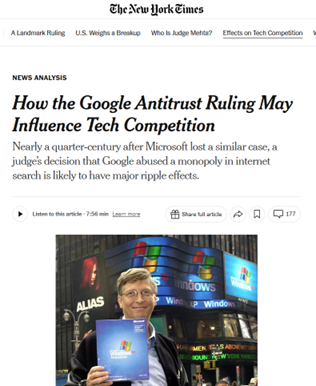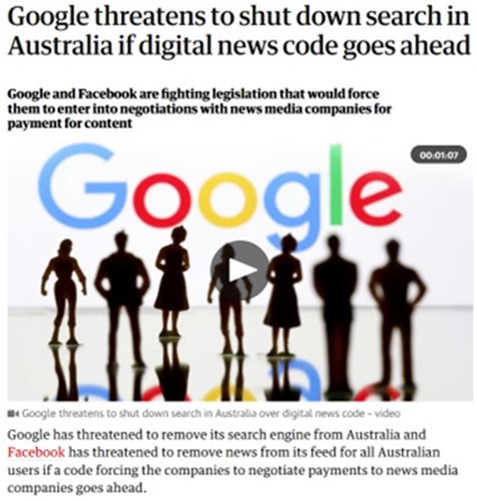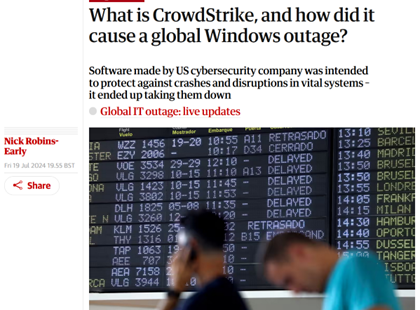
The future is in our hands, for the time being. Image: Geralt on Pixabay
By James Myers
“If we’re not careful, Microsoft, Amazon, and other large companies will leverage their position to set the policy agenda for AI, as they have in many other sectors.” – Opinion by Amba Kak, Sarah Myers West, and Meredith Whittaker, “Make No Mistake – AI is Owned by Big Tech,” published in the MIT Technology Review on December 5, 2023.
The conversion of ChatGPT-maker OpenAI from a non-profit to a profit-making company, with big-Five tech leader Microsoft as its major investor, is a sign that “there is no AI without Big Tech,” according to the authors of the MIT Technology Review opinion. The term ‘big tech’ commonly refers to a handful of large technology businesses, primarily Google, Apple, Facebook, Amazon, and Microsoft.
The authors wrote, “With vanishingly few exceptions, every startup, new entrant, and even AI research lab is dependent on these firms. All rely on the computing infrastructure of Microsoft, Amazon, and Google to train their systems, and on those same firms’ vast consumer market reach to deploy and sell their AI products.”
The recent antitrust ruling against Google puts the focus on trust in AI.

August 6, 2024 headline in The New York Times is evidence of the worldwide interest in the July 2024 antitrust decision against Google, and its implications for AI development.
The opinion writers’ concern that several big tech companies are shaping the future trajectory of AI was put in the spotlight with the landmark July 2024 ruling by US District Court Judge Amit Mehta that Google is operating an illegal monopoly. The case hinged on the U.S. government’s contention that Google’s overwhelming worldwide dominance in 90% of web searches, and the profits the company derives from advertising, was furthered by inducements paid to companies like Apple to make Google the default search engine for consumers.
The decision was made in a rare antitrust case launched by the U.S. Department of Justice with the support of 38 states. It came after another loss by Google at the end of 2023 in a lawsuit brought by Epic Games, which claimed that Google’s Play Store engages in anticompetitive practices at the expense of app makers. In that case, a jury deliberated for only three hours to reach a unanimous verdict against Google.
Google is now facing another antitrust action launched by the U.S. government and joined by 17 states. Hearings in the U.S. District Court in Alexandria, Virginia began this month to test the claim that Google’s acquisition in 2009 of tech company DoubleClick gave it an anticompetitive advantage in advertising technology. The Department of Justice argues that DoubleClick’s technology allowed Google to monopolize the digital advertising supply chain which provides over $12 billion in revenue annually to websites and apps in the U.S.
The government’s suit states that “Google engaged in a course of conduct to subvert the competitive process and entrench its monopoly power over three distinct types of ad tech tools that website publishers use to sell ads on their websites and advertisers use to buy ads on the open internet. Google’s monopolies in each of these separate markets was no accident but rather the result of a campaign to condition, control, and tax digital advertising transactions over 15 years. This campaign was exclusionary, anticompetitive, and mutually reinforcing.”
As a result, the government argues that “publishers are pushed to put more ads on their websites, to put more content behind costly paywalls, or to cease business altogether.” In its court filing, the government states that Google controls 91% of the publisher ad server market and more than 85% of the advertiser ad network market through Google Ads. In its rebuttal, Google argued that it faces intense competition from big tech companies Meta (owner of Facebook), Amazon, Microsoft, and others.
Could these decisions mark a turn in the future trajectory of AI development?
The answer to the question might depend fundamentally on whether the big tech companies can maintain public trust in their products, or whether their practices will undermine trust. A great deal is at stake. At the end of last month, Apple alone accounted for $3.44 trillion of value of public market trading while shares of Microsoft, Google’s parent company Alphabet, Amazon, and Facebook’s parent Meta collectively amounted to $8.16 trillion of market value, according to Statista.
An erosion of public trust could lead to a dramatic increase in competition and decrease in profits for big tech companies like Google’s parent Alphabet (last year’s profit $79 billion) and Microsoft (which was not far behind Alphabet last year with a profit of $72 billion). Although these profits are astronomical, it’s worth noting that there’s no intrinsic value to money of any amount. Any value in money is derived entirely from the trust that we place in it as a medium of exchange, and with such great profits at stake, investors in such highly valued companies should be concerned that they maintain public trust.

As we noted in our February 2024 feature, Can We Trust the Global Index of Data?, The Guardian reported in 2021 on Google’s use of its market dominance in threatening to cut off the flow of information to 27 million Australians over proposed legislation the company disagreed with.
While Judge Mehta will take a year to determine remedies to impose, after receiving recommendations from the Department of Justice and states by the end of 2024, Google’s parent company Alphabet is appealing the antitrust ruling. Although the court agreed to Google’s request for some competitively sensitive case facts to be withheld from the public, it’s widely reported that Google paid $20 billion to Apple to be the default search engine on its web browser, and that Google provides a staggering 90% of worldwide web searches.
Judge Mehta wrote, “Unconstrained price increases have fueled Google’s dramatic revenue growth and allowed it to maintain high and remarkably stable operating profits.”

July 19, 2024 headline in The Guardian about the global Microsoft Windows outage triggered by a faulty software update from the company CrowdStrike.
Trust is not an easy thing to maintain, especially when a profit motive outweighs other considerations. AI companies are developing increasingly powerful applications on which we rely for everyday activities, and trust can easily be lost with costly errors or products introduced without adequate testing.
Evidence of this is the reputational damage to Microsoft that ensued from the massive global disruption this July.
A faulty software update by cybersecurity company CrowdStrike, whose applications are widely used by airlines and hospitals, caused a failure in Microsoft’s Windows operating system and disabled over eight million devices dependent on it. On July 19, 2024, aircraft were grounded, health care procedures cancelled, and global payments disrupted by the sequence of problems triggered by what CrowdStrike attributed to a faulty piece of code.
Reuters reported that the Windows malfunction caused the cancellation of about 7,000 Delta Air Lines flights over five days, affecting 1.3 million travellers and costing the airline $500 million, for which Delta is seeking compensation from CrowdStrike and Microsoft. The tech companies have vowed to defend themselves “aggressively” and “vigorously.”
Another AI company that would do best to maintain public trust is OpenAI, with its powerful generative AI applications ChatGPT, DALL-E, and Sora.
The Quantum Record has expressed our editorial concern about the unresolved conflict between OpenAI’s recently-adopted profit motive and its mission statement that the smarter-than-human Artificial General Intelligence it seeks to develop “benefits all of humanity.” Most recently, in What Comes Next, After Profit-Driven OpenAI Cracks the Intelligence Code?, we wondered what undisclosed arrangements apply to Microsoft’s latest $10 billion investment in OpenAI and the exclusive data sharing arrangement between the two companies.
When OpenAI announced the release of GPT-4o this May, the company’s CEO Sam Altman wrote, “Our initial conception when we started OpenAI was that we’d create AI and use it to create all sorts of benefits for the world. Instead, it now looks like we’ll create AI and then other people will use it to create all sorts of amazing things that we all benefit from.”
To our historical perspective, it seemed naïve for Sam to trust that third parties would create only amazing and beneficial things with the powerful technology, and we expressed our particular concern at the time with the question, “Now that OpenAI has ceded application development to “other people” (meaning presumably other companies), how can the company possibly fulfill the second part of its mission statement – you know, that thing about benefiting all of humanity?”
Since we asked the question, we note that OpenAI’s website now prominently displays a response: “We are building safe and beneficial AGI, but will also consider our mission fulfilled if our work aids others to achieve this outcome.”
While OpenAI discloses a number of controls it maintains to prevent abuse of its generative AI technology, history demonstrates that bad actors can be very creative and it’s not possible for one company to foresee all the ways that generative AI could be used to create text, images, and sounds with an intention to deceive others.
Microsoft stands to gain up to $1 trillion from its investment in OpenAI LP, the for-profit partnership created by OpenAI, which is still (at least on paper) governed by a non-profit entity. We don’t know how much profit Microsoft will reap from the relationship because OpenAI doesn’t publicly disclose its pledge for return on investment, but OpenAI’s for-profit charter allows the company to return as much as 100 times Microsoft’s invested capital. A $10 billion investment could therefore reap a profit of $1 trillion for Microsoft, leaving little if anything to fund non-profit activities.
A $1 trillion return on its investment would represent nearly 14 years of annual profits for Microsoft, if it continues to generate last year’s net income of $72 billion.
When asked for disclosure, the companies responded that the details could reveal sensitive information to competitors. Is that the only reason that OpenAI’s non-profit governance board doesn’t trust the public to know what return on investment was pledged to Microsoft and what, if anything, might be left for the non-profit public benefit?

Trust written in shifting sands. Image by LisaLove2Dance on Pixabay.
The ultimate question for the direction of AI may be the question of trust.
What kind of technological future do we believe in, and what future will we choose to create while we hold the power to make our dreams come to life?
Profit-making is the basis of the capitalist system and has, unquestionably, driven incredible innovations in technology. Profits are, however, measured in the short-term, because there’s no reliable mechanism to gauge the longer-term sustainability of practices that are currently profitable. I make this assertion with some authority, as an accountant whose work involves the measuring of profits.
In our most recent editorial, The Real and Present Dangers of Reducing Four-Dimensional Living to Two-Dimensional Screen Projections, we wrote that “in the long run the companies might realize that working cooperatively with regulators to maintain a vibrant four dimensions of reality will be as good for business as it’s good for the rest of us, the customers. That’s because there’s exponentially greater potential to generate future data – and therefore future profit – in four dimensions than in two.”
There’s an old saying that rings true in the current circumstances: “Be careful what you wish for.”
The options we face might be as stark as a future in which we as humans are free to use AI for our collective benefit, or a future that’s increasingly shaped by algorithms of the big tech companies as they continue their rapid growth.



